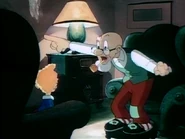No edit summary |
|||
| Line 34: | Line 34: | ||
* (1986) VHS - ''[[Viddy-Oh! For Kids Cartoon Festivals]]: Elmer Fudd Cartoon Festival Featuring "An Itch in Time"'' |
* (1986) VHS - ''[[Viddy-Oh! For Kids Cartoon Festivals]]: Elmer Fudd Cartoon Festival Featuring "An Itch in Time"'' |
||
* (1992) LaserDisc - ''[[The Golden Age of Looney Tunes]]'', Volume 2, Side 9 |
* (1992) LaserDisc - ''[[The Golden Age of Looney Tunes]]'', Volume 2, Side 9 |
||
| + | * (2020) Streaming - HBO Max (restored) |
||
== Notes == |
== Notes == |
||
Revision as of 08:21, 21 August 2020
Deprecated
We have moved to portable infoboxes using the new Template:Shorts
Please do not use this template anymore. It is left here for reference purposes.
| The Hardship of Miles Standish | |||||||||||||||||||||||||||||||||||||||||||||
| |||||||||||||||||||||||||||||||||||||||||||||
|
The Hardship of Miles Standish is a 1940 Merrie Melodies short directed by Friz Freleng.
Title
The title and story are a play on The Courtship of Miles Standish.
Plot
Dissatisfied with the The Courtship of Miles Standish story as heard on the radio ("Ahhh fiddlesticks! That's not the way I heard it at all! Even if it did happen that way. It couldn't have happened that way!"), an old man tells his grandson the "true story" of John and Priscilla.
Set many years back in Plymouth in the year 1621 1/2, Elmer Fudd is messenger John Alden, sent to give Miles' love letter to Priscilla, in the form of a singing telegram. While delivering the message, however, her house is attacked by Indians, and John is the only one who can save her. The Indians were all easily defeated by John confronting them for breaking the glass window of Priscilla's house ("One of you folks gotta pay for that glass!"), causing the Indians, who all are afraid to pay for the broken glass window, to flee foolishly. Priscilla, impressed with John's heroism, dumps Miles for John, and affectionately kisses John repetitively, much to the latter's chagrin due to Priscilla's very elderly and unattractive appearance, as well as the fact that Miles actually wants to marry Priscilla.
Once the story is over, the old man remarks that if his story wasn't true, he wished to get struck by lightning ("If that ain't the truth. I hope lightning strikes me!"), and he did got struck by lightning, causing a huge damage in the house, while both the boy and his grandpa fortunately survived. The old man remarks "Maybe now, that's the way I heard it!", before jeering at the audience.
Availability
- (1986) VHS - Viddy-Oh! For Kids Cartoon Festivals: Elmer Fudd Cartoon Festival Featuring "An Itch in Time"
- (1992) LaserDisc - The Golden Age of Looney Tunes, Volume 2, Side 9
- (2020) Streaming - HBO Max (restored)
Notes
- The Miles Standish character is a caricature of comic actor Hugh Herbert and the Priscilla character is a caricature of actress Edna May Oliver.[1] The short features the voice of Arthur Q. Bryan as Elmer, who also performs the song You Must Have Been a Beautiful Baby.
- The short’s narrator (the old man) is based on the “Old-Timer” character from the Fibber McGee and Molly radio show.
- The print of this short on The Golden Age of Looney Tunes LaserDisc had the 1940 ending card replaced with the 1947-48 Merrie Melodies ending card. However, the original ending exists on the Viddy-Oh! For Kids Cartoon Festivals tape.
- Some of the montages of Native American Indians were reused animation from "Sweet Sioux" (1937) directed by Friz Freleng three years earlier.
- At one scene when one Indian accidentally hit the arrow towards the Indian's head where the arrows fall off his head, the other Indian responded by silently mouthing the words "Goddamn, son of a bitch!", followed by the same Indian responding with a "Pardon me." This was a subtle gag meant to reference using curse words, as cursing was considered taboo by the Hays Code censors at the time.
- The ending gag where the old man wishes to be struck by lightning if his story wasn't true would later be re-used in the endings of both "The Trial of Mr. Wolf" (1941) and "His Hare-Raising Tale" (1951) when both Mr. Wolf and Bugs Bunny's respective stories aren't true, except that in the latter two cartoons instead of being struck by lightning they got run over by streetcars.
- This cartoon is seldom seen on American television today due to Native American stereotyping playing a role in the plot.
Gallery
References
- ↑ (1989) Looney Tunes and Merrie Melodies: A Complete Illustrated Guide to the Warner Bros. Cartoons. New York, NY: Henry Holt and Company, page 102. ISBN 0-8050-0894-2.
|
This article/section is a stub. You can help Looney Tunes Wiki by expanding it. |

|







